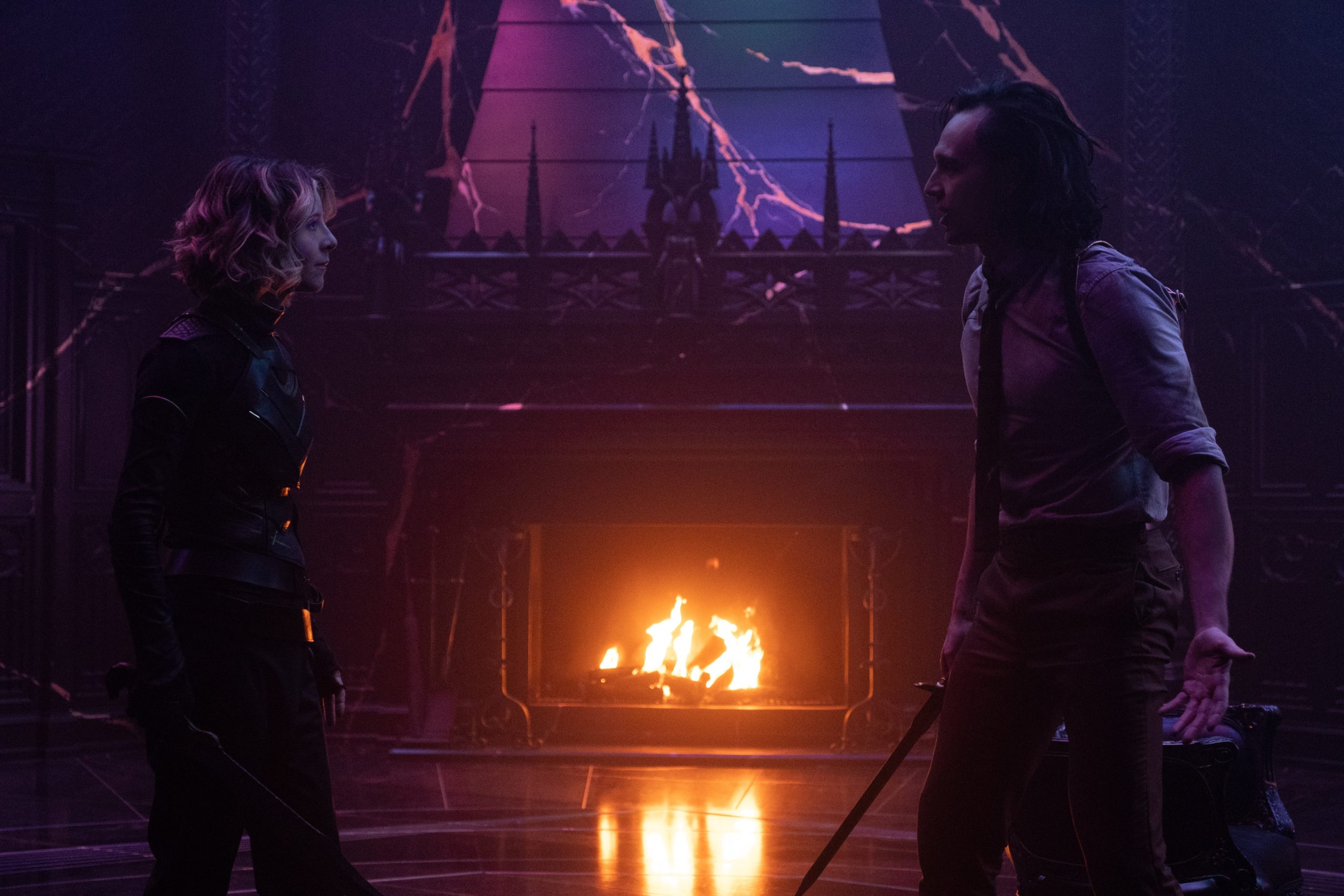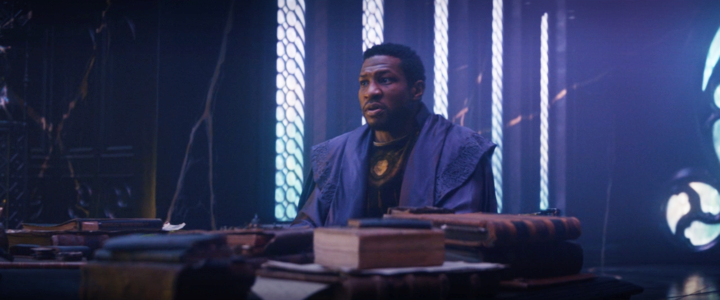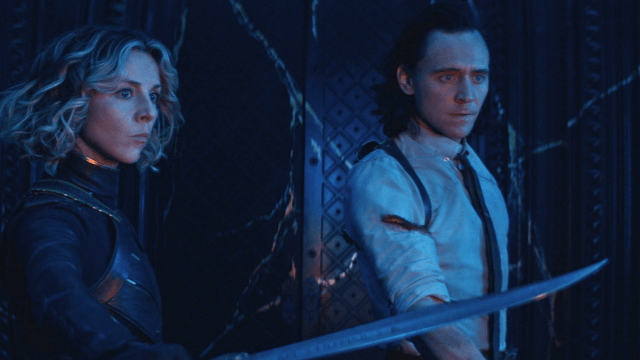Loki’s finale is here, and it’s time for questions to be answered. Will Sylvie and Loki get what they want? What’s hiding out at the end of time? How do you wrap up six episodes of television that feel dramatically satisfying in spite of the larger animus of the cinematic universe around them? The answers, it turns out, are much more complicated than you’d think.

Even as the title of an episode, Disney+ and Marvel’s “For All Time. Always.” feels like something of a crushing statement about the cyclical nature of the long-running Marvel Cinematic Universe. It’s here to stay, always building one thing into the next, a neverending loop — not unlike the stream of time we’re introduced to as the Marvel Studios logo coalesces into the opening of the episode. And now, surrounded by that literal loop of time, Sylvie and Loki are confronted with their ultimate battle: a very, very long conversation with the surprising star of the episode, Lovecraft Country’s Jonathan Majors, showing up with a script’s worth of information, a yearning desire to delightfully chew as much scenery as possible while delivering it, and a name.
Well, sort of. Majors’ mystery figure at the heart of this end-of-time-limbo is referred to throughout as He Who Remains, but to the Marvel Cinematic Universe fans Loki’s finale is squarely aimed at, his true identity is immediate and familiar — Kang. You knew he’d show up. You’re expected to know who he is, because he’s been cast in other Marvel movies to come, and you’ve read the theories. You know how this works, Loki says, with the slick confidence of a tilted camera angle and Major’s charismatic introduction. He is inevitable, and he is Kang.
In many ways, “For All Time. Always.” feels akin to its immediate predecessor “Journey Into Mystery” in terms of form — a chance for Loki to lovingly swing big at the comic book source material that inspired it, littered with connections of what was, could be, and is to come.
But where the two episodes differ quite drastically is that, in spite of its smörgåsbord of nods to comics, “Journey” still stuck to the central thesis of unpacking just who Tom Hiddleston’s reforming God of Mischief was, re-flung onto the arc we saw him undergo across the Marvel movies before Infinity War, reframed in a new and much more intimate light.
The season one finale stumbles most when it forgets to draw on that intimacy because it’s far too enchanted with Majors’ “He Who Remains” delivering an extended explanation for what will set up future Marvel movies (and, as revealed in the post-credits, a second season of Loki).

The vast majority of the runtime is dedicated to He Who Remains’ wiki-esque infodump of both who he is and what he means to Marvel’s wider universe at large: a scientist, originally from the 31st century, who discovered the keys to the multiverse, and met his variants from across strands of timelines. At first, he did so to great gain, but, almost inevitably, things went wrong.
Soon an all-out multiversal war took place that left him standing alone, separating a singular timeline away for safekeeping as he controlled its flow through the TVA, ensuring that another multiverse — and his more domineering variants — could ever arise again. This of course (should Loki and Sylvie refuse his offer to be given their own idealistic lives in a controlled, altered version of the timeline), has huge ramifications on what Marvel intends to do with future projects.
We already know a good chunk of that future. From the rapidly incoming What If…? animated series, and Doctor Strange and the Multiverse of Madness — itself already having brickwork laid by WandaVision’s conclusion — to the third Ant-Man and the Wasp movie that Majors was already cast in, and the many rumours about Spider-Man: No Way Home and beyond, a multiverse is an enticing prospect, one that is laden with potential.
The freedom for Marvel, at the apex of its popularity, to tell the sort of stories it lacked both the confidence to tell in the past to push its storytelling beyond a strictly linear canon of events and just tell stories because they’re interesting, rather than because they matter to a distinct adaptive version of its chronology. But the problem with that is that none of these things are Loki.
That potential is all about the future of Marvel’s media, and not the current moment it has in delivering a satisfying conclusion to Loki’s first season — and that’s where “For All Time. Always.” stumbles hardest.
It’s a bold decision to have its climactic episode be a tense, extended conversation piece, meaning that no character we’ve come to know quite gets the satisfaction of a bookend to the journeys they went on across the season. It’s there, in fits and starts, as Loki and Sylvie’s repeated defiance of what He Who Remains tells them (in spite of the increasing realisation for one of them, at least, that there’s the possibility he’s the least-worst version of a nightmare scenario), culminating in a tragic clash of wills.
Loki, having internalised that one version of his future glimpsed in the premiere, cannot bring himself to kill He Who Remains and usher in chaos for chaos’ sake. Sylvie, still haunted by the evils the TVA forced upon her in his name, chooses to stick to her gut and bring about that chaos, tearing her and Loki apart even as they finally make their feelings for each other explicit. It’s a compelling moment, but also just that. A moment, cast under the shadow of the episode’s wider fixation on the implications of things to come.

At least the reveal that this is not the end of Loki takes the sting out of the episode’s fascination with what’s next, even if, humorously, by promising us that what’s next is more Loki. There will be a chance once again to return to these characters — wherever Sylvie goes after killing He Who Remains, his almighty TemPad now hers, and Loki, trapped in a version of the TVA where his old allies don’t recognise him, servants to a much more conquering variant of Kang — and provide the closure this finale couldn’t quite willingly provide.
But once again, like so many Marvel endeavours before us, it asks us to forgo narrative satisfaction in the here and now for the promise of what entertainment is to come next. There’ll be more Marvel, we’ll see these characters again, and maybe, perhaps then, there’ll be something to chew on. Or maybe not, if this trend continues perpetually.
That’s the funny thing about the future — it’s always ahead of us, promising potential that’s forever out of reach. Time will tell just how satisfying the journey chasing that potential will be, for Loki or otherwise, as we keep running after it.
